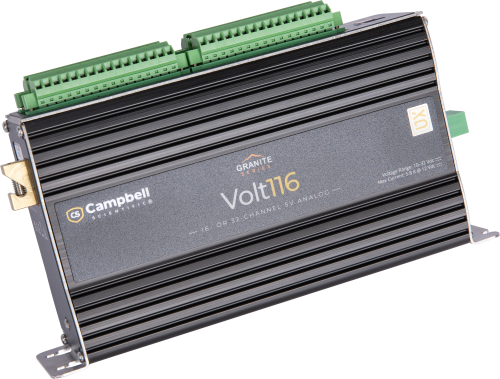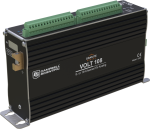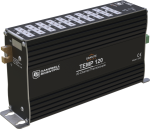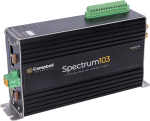
Ideal for concentrated or distributed measurements






Overview
The Granite™ Volt 116 easily expands the channel count on your data-acquisition system. It has 16 differential or 32 single-ended input channels, as well as four excitation channels. It provides programmable, precision excitation for standard sensor measurements and power outputs for controlling sensors and peripherals. The Volt 116 features a 24-bit, analog-to-digital converter with low-noise performance for superior analog measurements.
Benefits and Features
- 24-bit ADC and low-noise inputs for increased measurement quality
- Distributed data acquisition
- Channel count expansion via the CPI bus on Campbell Scientific data loggers
- Easier to program than traditional multiplexers
- Programmable noise rejection
- CANbus 2.0 A/B output available with the Extended Duty (-XD) version
- USB 2.0 interface for PC-based operation with Campbell Scientific Surveyor software
Images











3D/CAD Files:
Videos & Tutorials
Compatibility
Please note: The following shows notable compatibility information. It is not a comprehensive list of all compatible products.
Dataloggers
| Product | Compatible | Note |
|---|---|---|
| CR1000X (retired) | Requires OS version 4 or greater. | |
| CR6 | Requires OS version 10 or greater. |
Miscellaneous
| Product | Compatible | Note |
|---|---|---|
| Granite 10 | Requires OS version 1 or greater. | |
| Granite 6 (retired) | Requires OS version 1 or greater. | |
| Granite 9 | Requires OS version 1 or greater. |
Additional Compatibility Information
The Volt 116 is compatible with CPI-enabled data loggers only.
Specifications
| Mounting | Standard 1-in. grid (DIN rail mounting available) |
| Operating Temperature Range |
|
| Power Requirements | 9.6 to 32 Vdc voltage |
| Accuracy |
|
| Number of Channels | 16 differential or 32 single-ended inputs |
| Analog Inputs | 32 single-ended or 16 differential (with ±5000 mV, ±1000 mV, ±200 mV ranges 24 bit ADC) |
| Maximum Scan Rate |
|
| Input Range | ±5000 mV, ±1000 mV, and ±200 mV |
| Period Averaging | Traditional period averaging on analog input channels |
| CPI | For data logger connection. Baud rate selectable from 50 kbps to 1 Mbps. (Allowable cable length varies depending on baud rate, number of nodes, cable quality, and noise environment, but can be as long as 700 m under proper conditions.) |
| USB | USB 2.0 full speed connection available for attaching to a PC. (Port is used to configure the module and download updates via our Device Configuration Utility.) |
| Warranty | One year against defects in materials and workmanship |
| Dimensions | 20.3 x 12.7 x 5.1 cm (8 x 5 x 2 in.) |
| Weight | 0.9 kg (1.95 lb) |
Typical Current Drain |
|
| Sleep | <1 mA |
| Active 1 Hz Scan |
2 mA (estimated) Assumes one single-ended measurement with the first notch frequency (fN1) at 30 kHz Note: Any sensor excitation or switched power loads will be additive to this value. |
| Active 20 Hz Scan |
20 mA Assumes one single-ended measurement with the first notch frequency (fN1) at 30 kHz Note: Any sensor excitation or switched power loads will be additive to this value. |
| Active 1 kHz Scan |
67 mA Note: Any sensor excitation or switched power loads will be additive to this value. |
Voltage/Current Excitation Outputs |
|
| Voltage Excitation | ±5 V (@ 50 mA) |
| Current Excitation | ±2.5 mA (±5 V compliance voltage) |
| Number of Voltage/Current Excitation Outputs | 4 |
General Purpose Outputs |
|
| Number of SW5V Outputs | 4 |
| SW5V Output Resistance | 30 Ω |
| Number of SW12V Outputs | 2 |
| Typical Limit of SW12V Outputs | 200 mA |
| Minimum Limit of SW12V Outputs | 180 mA |
| Number of 12V Outputs | 2 |
| Typical Limit of 12V Outputs | 200 mA |
| Minimum Limit of 12V Outputs | 180 mA |
Related Documents
Manuals
Miscellaneous
Related FAQs
Number of FAQs related to Granite Volt 116: 8
Expand AllCollapse All
-
in Burst Mode operation, repeated measurements are performed on the same channel for X number of times, then there is a waiting period for the measurements to be processed and transmitted to the data logger. No measurements can be made during this processing period. The maximum capture rate is 30 kHz on a single channel for a duration of 2.18 seconds (absolute maximum capability).
-
Yes, both 11-bit and the 29-bit (extended) message identifiers are supported.
-
Yes, a specific CAN ID can be selected for each module.
-
in continuous scan mode (normal operation), 1 kHz on 1 channel is typical.
-
The CPI bus speed is adjustable in your CRBasic data logger program. Use the CPISpeed() instruction in your CRBasic program to adjust the CPI bus bandwidth to meet the following maximum combined (total) Ethernet cable lengths:
- 1000 kB/s for maximum combined Ethernet cable lengths of 15.2 m (50.0 ft)
- 500 kB/s for maximum combined Ethernet cable lengths of 61 m (200 ft)
- 250 kB/s for maximum combined Ethernet cable lengths of 152.4 m (500 ft)
-
The Volt 108/116 XD and Temp 120 XD output CAN2.0b data frames in Big Endian byte format.
-
All outputs except strain gauge calculated microstrain are supported in CANOut:
- Volt SE/Diff output in mV
- BridgeFull in mv/V
- BrHalf3W and BrHalf4W in Rs/Rf
- Temp 120 output in desired temperature units
Note: Strain values are in mV/V and either need a data logger or post processing to calculate microstrain.
-
Only the XD versions (not the SD) support CANOut 2.0b. To enable this function, use our SURVEYOR software. When SURVEYOR recognizes an XD module, a CAN Enable menu appears with a “CAN Enabled” slider switch.
Case Studies
China is making strides in the global wind energy market, especially when it comes to......read more
Overview In the fight against climate change, innovative solutions are emerging to address the global challenge......read more






